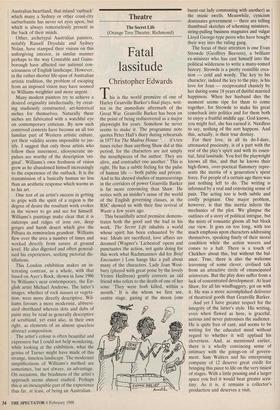Theatre
The Secret Life (Orange Tree Theatre, Richmond)
Fatal lassitude
Christopher Edwards
This is the world premiere of one of Harley Granville Barker's final plays, writ- ten in the immediate aftermath of the Great War. Granville Barker has been on the point of being rediscovered as a major playwright for years. Somehow he never seems to make it. The programme note quotes Peter Hall's diary during rehearsals in 1977 for The Madras House: '. . . it's ten times richer than anything Shaw did at this period, for the characters are not simply the mouthpieces of the author. They are alive, and contradict one another.' This is right. He has a subtle feeling for the pulse of human life — both public and private. And in his shrewd studies of manoeuvrings in the corridors of power Granville Barker is far more convincing than Shaw. He writes with an insider's sense of the world of the English governing classes, as the RSC showed us with their fine revival of Waste a few years ago.
This beautifully acted premiere demons- trates both the good and the bad in his work. The Secret Life inhabits a world whose spirit has been exhausted by the war. Ideals are sacrificed, love affairs are doomed (Wagner's `Liebestod' opens and punctuates the action, not quite doing for this work what Rachmaninov did for Brief Encounter.) Loss hangs like a pall about many of the characters. Lady Joan West- bury (played with great poise by the lovely Vivien Heilbron) gently corrects an old friend who refers to the death of one of her sons: 'They were both killed, within a month.' It is she whom we first see, centre stage, gazing at the moon (one burnt-out lady communing with another) as the music swells. Meanwhile, cynicism dominates government — there are telling thumbnail sketches of scheming ministers, string-pulling business magnates and vulgar Lloyd George-type peers who have bought their way into the ruling gang.
The focus of their attention is one Evan Strowde (Geoffrey Beevers), a brilliant ex-minister who has cast himself into the political wilderness to write a many-tomed history. Strowde is a pretty resistible crea- tion — .cold and wordy. The key to his character, indeed the key to the play, is his love for Joan — reciprocated chastely by her during some 18 years of dutiful married happiness. When her husband dies the moment seems ripe for them to come together, for Strowde to make his great comeback into politics and for them both to enjoy a fruitful middle age. God knows, you might feel, she has earned it. Needless to say, nothing of the sort happens. And this, actually, is their true destiny.
For their love, in all its do-I-dare, attenuated preciosity, is of a part with the rest of the play's spirit and with its essen- tial, fatal lassitude. You feel the playwright knows all this, and that he knows their high-flown, over-poetical flammery repre- sents the inertia of a generation's spent force. For people of a certain age there was just nothing left to do. The writing is informed by a real and convincing sense of pain. The acting too is both subtle and coolly poignant. One major problem, however, is that this inertia infects the mechanics of the plot. We glimpse the outlines of a story of political intrigue, but the mists of romantic gloom all but block our view. It goes on too long, with too much emphasis upon characters addressing themselves, speaking finely of their moral condition while the action wavers and comes to a halt. There is a touch of Chekhov about this, but without the bal- ance. True, there is also the welcome leavening of some clever, civilised talk from an attractive circle of emancipated aristocrats. But the play does suffer from a lack of concentrated development. At least Shaw, for all his windbaggery, got on with it. He was a more accomplished deliverer of theatrical goods than Granville Barker.
And yet I have greater respect for the integrity of the latter's style. His writing, even when flawed as here, is graceful, serious and never patronises the audience. He is quite free of cant, and seems to be writing for the educated mind without regard to whether it will applaud his cleverness. And, as mentioned earlier, there is a wholly convincing sense of intimacy with the goings-on of govern- ment. Sam Walters and his enterprising company of 12 deserve great credit for bringing this piece to life on the very tiniest of stages. With a little pruning and a larger space you feel it would bear greater scru- tiny. As it is, it remains a collector's production and deserves a visit.


















































 Previous page
Previous page